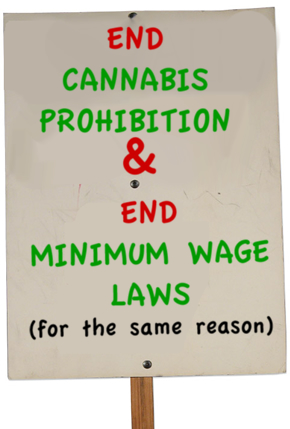Against Cannabis Prohibition?: Why You Should Oppose Minimum Wage Laws Too
May 3, 2015 by Paul McKeever
 Recently, on facebook.com, I quipped that “Behind every minimum wage increase, there’s an overpaid, uncompetitive (probably government-funded) venture looking to eliminate (private sector) price competitors.” One of my acquaintances, who I know to be an active opponent of cannabis prohibition, replied by posting an article titled “The 3 Biggest Myths About Raising the Minimum Wage“. The three alleged myths were that:
Recently, on facebook.com, I quipped that “Behind every minimum wage increase, there’s an overpaid, uncompetitive (probably government-funded) venture looking to eliminate (private sector) price competitors.” One of my acquaintances, who I know to be an active opponent of cannabis prohibition, replied by posting an article titled “The 3 Biggest Myths About Raising the Minimum Wage“. The three alleged myths were that:
1. Minimum wage jobs are primarily for teenagers or part-time workers who are just trying to score some extra cash.
2. Raising the minimum wage will raise prices.
3. Raising the wage kills jobs.
The reader will notice that each of these arguments is an argument about economic effects, not about ethics (i.e., not about right and wrong). Yet, as with every question about the use of government force, one cannot judge minimum wages simply by the facts – whatever the facts might be. One also has to take the next step: determining whether minimum wage laws are politically right or wrong (i.e., whether they are consistent with the goal of ensuring that no person takes your life, liberty, or property without your consent). Accordingly, I replied to my fellow anti-prohibitionist as follows:
“Arguing for minimum wage laws is exactly like arguing for cannabis prohibition.
Andy has a big lawn and a wallet full of cash. He also has an anti-pot neighbour, Barbara, and a neighbour named Chuck who provides lawn-cutting services at $11.25 per hour. Across the street live Dan and Ethel. Dan grows and sells weed. Ethel provides lawn-cutting services at $5 per hour.
Dan comes over to Andy with a quantity of weed and offers to sell it to Andy for $500. Barbara comes over with her gun, points it at Dan and says “you’re coming with me, I’ve got a locked pantry in my basement and it has your name on it for the next 5 years”. She turns to Andy, saying: “And if you don’t want to join Dan in my pantry, you’ll keep your hands off of that weed and your money in your pocket!”. At gunpoint, she takes Dan to her basement and locks him in the pantry, where she keeps him for 5 years.
Next across the street comes Ethel, offering to cut Andy’s lawn (it’ll take about one hour) for $5. Like a pitbull defending his turf, out comes Chuck with his shotgun. Pointing it at Andy, he says: if you let Ethel cut your lawn for $5, I’m going to take all of the money that is in your wallet, right now.” Andy says: “F-U, I’m not giving you my money”. Chuck replies “Then I’ve got a pantry in my basement with your name on it”. Ethel leaves, with an empty wallet. Chuck – still pointing the shotgun at Andy – says “I’m offering to cut your lawn for $11.25, and not a penny less, what do you say?”. Andy absolutely needs his lawn cut, and is physically unable to do it himself. “Fine”, says Andy.
That’s the law, in a nutshell. The point is: it is morally wrong for Dan and Ethel to use force to prevent people from engaging in peaceful personal trade and behaviour. Andy and Dan buying and selling weed would not have involved taking Barbara’s life, liberty, or property. Andy and Ethel buying and selling grass-cutting services would not have involved taking Chuck’s life, liberty, or property. Barbara and Chuck are criminals, even by the laws we have today.
The only difference between Barbara and Chuck on the one hand, and a cop on the other, is that the law currently gives the cop the power to abuse force in the exact same way as did Barbara and Chuck…but without getting arrested for assault, battery, extortion, wrongful confinement, robbery, etc..
When it comes to cannabis prohibition, the key issue is not medical: just as with sugar and alcohol, it doesn’t matter whether cannabis is good for you or bad for you. Rather, the key issue is political. What matters is whether your cultivation, selling, buying, or use of cannabis involves taking another person’s life, liberty, or property without his consent. Cannabis prohibition is bad law because growing, selling, buying and consuming do not involve taking another person’s life, liberty, or property without his consent. Instead: cannabis prohibition laws wrongly involve the government in taking another person’s life, liberty, or property without his consent.
Likewise, when it comes to minimum wage laws, the key issue is not economic: it doesn’t matter whether most minimum wage earners are young or old, rich or poor, students or whatever. It doesn’t matter whether minimum wages do or do not reduce the number of jobs. Rather, the key issue is political. What matters is whether your purchase or sale of labour, at any given price, involves taking another person’s life, liberty, or property without his consent. Minimum wage laws are bad laws because the purchase or sale of labour, at any given price, does not involve taking another person’s life, liberty, or property without his consent. Instead: minimum wage laws wrongly involve the government in taking another person’s life, liberty, or property without his consent.





Comments